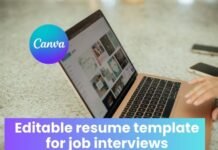Last Updated on October 15, 2025
A resume is the very first impression you create in front of a recruiter or hiring manager. Even before meeting you, your resume speaks for you. If it is poorly written, filled with errors, or lacks clarity, chances are you will be rejected without ever being called for an interview. Studies show that recruiters spend only a few seconds scanning each resume. That means you don’t have much time to prove your worth. Every word, every sentence, and even formatting plays an important role in building trust.
This is why avoiding common resume mistakes is absolutely essential. While you may have great skills and experience, a badly prepared resume can hold you back. In this guide, we’ll cover the most frequent resume mistakes to avoid and provide you with clear, practical solutions. By fixing these issues, you can present yourself as a strong, confident, and detail-oriented professional.
Typos and Grammatical Errors
One of the simplest yet most damaging resume mistakes is allowing typos or grammatical errors to slip through. A small spelling mistake may look harmless to you, but to a recruiter, it signals carelessness. Employers often assume that if you can’t be careful with your own resume, you might not be careful in your work either.
For instance, confusing “manger” with “manager” or misusing “their” and “there” instantly weakens your credibility. Recruiters may even reject your resume without reading further.
The best way to avoid this mistake is to:
- Proofread your resume multiple times.
- Use tools like Grammarly or built-in spell-check.
- Ask a trusted friend, mentor, or colleague to review it for errors.
Remember, your resume is not just a document; it’s a reflection of your professionalism. An error-free resume demonstrates seriousness and attention to detail, qualities every employer values.

Lack of Specifics
Another common resume mistake is being too vague. Writing statements like “responsible for managing projects” or “helped in sales activities” doesn’t show your real value. Recruiters want to know what you achieved and how your contribution made a difference.
Instead of general duties, use measurable results and concrete details. For example:
- Weak: “Managed sales team.”
- Strong: “Led a sales team of 12 and increased annual revenue by 25% in six months.”
Numbers, percentages, and specific achievements grab attention. They allow recruiters to visualize your success and understand the value you can bring to their company. Being specific separates you from the crowd and makes your resume far more compelling.
Attempting the “One–Size–Fits–All” Approach
One of the biggest resume mistakes to avoid is sending the exact same version of your resume to every job posting. Employers want to see that you’ve taken time to understand their specific needs. A generic resume looks lazy and fails to highlight how your skills match the position.
Another issue is Applicant Tracking Systems (ATS). Many companies use ATS software to scan resumes for keywords before a human even sees them. If your resume doesn’t contain the exact keywords from the job description, it may be filtered out immediately. A one-size-fits-all approach almost guarantees your resume will miss those important keywords.
The smarter solution is to create a master resume with all your experience and achievements. Then, for each job application, tailor the resume by highlighting the most relevant points. This doesn’t mean rewriting everything, but making small adjustments such as:
- Including job-specific keywords.
- Reordering bullet points to match the job description.
- Highlighting relevant achievements first.
A tailored resume shows employers that you are serious about the position and increases your chances of getting shortlisted.
Highlighting Duties Instead of Accomplishments
Another mistake many job seekers make is focusing only on job duties instead of achievements. Simply listing what you were responsible for does not separate you from other candidates. Every employee in that role likely had similar duties. What employers want to know is: What difference did you make?
For example:
- Duties: “Handled customer service phone calls.”
- Accomplishment: “Resolved an average of 50+ customer issues per day with a 95% satisfaction rate.”
By turning duties into accomplishments, you immediately prove your value. Employers see not just what you did, but how well you did it. Always try to include measurable results like percentages, dollar amounts, or time saved.
Some strong accomplishment examples include:
- “Reduced production costs by 15% through process improvements.”
- “Implemented a new training program that increased team productivity by 20%.”
- “Generated $500,000 in new sales through targeted marketing campaigns.”
The key is to show impact. Accomplishments make your resume memorable and demonstrate that you are results-oriented, which is exactly what recruiters want to see.
Going on Too Long or Cutting Things Too Short
Another common resume mistake to avoid is ignoring the ideal length. Both extremes—making it too long or too short—can work against you.
A resume that goes on for four or five pages overwhelms recruiters. They don’t have the time to dig through unnecessary details. If you list every job you’ve ever had, including irrelevant experiences, your most important achievements get buried.
On the other hand, a resume that’s only half a page may give the impression that you don’t have enough skills or experience, even if you do. Cutting things too short leaves out key accomplishments that could help you stand out.
The golden rule is:
- Keep it one page if you have less than 10 years of experience.
- Extend to two pages only if you have significant, relevant experience.
Always prioritize quality over quantity. Focus on what truly matters to the job you’re applying for. The right length keeps your resume concise, powerful, and recruiter-friendly.
Bad Summary
The summary section at the top of your resume can either grab the recruiter’s attention or lose it immediately. Unfortunately, many candidates make the mistake of writing a weak or generic summary.
Bad summaries often include clichés like:
- “Looking for a challenging role in a reputed company.”
- “Hardworking professional with good communication skills.”
These lines don’t tell employers anything meaningful. They could apply to anyone.
A good summary should be short, specific, and powerful. It should highlight your top skills, achievements, and what you aim to bring to the new role. Ideally, keep it within 3–4 sentences.
Example of a strong summary:
“Results-driven marketing manager with 8+ years of experience in SEO, PPC, and social media. Increased organic traffic by 120% in two years and successfully managed $500K annual ad budgets. Passionate about developing innovative strategies to boost brand growth.”
This type of summary immediately shows your expertise, results, and value. Recruiters reading this will instantly know why they should keep looking at your resume.
No Action Verbs
One of the most overlooked resume mistakes to avoid is writing without strong action verbs. When your sentences sound passive, your contributions appear less impactful. For example, writing “responsible for project management” feels weak and uninspiring.
Action verbs, on the other hand, create a sense of ownership and achievement. Compare the two:
- Weak: “Worked on a new marketing strategy.”
- Strong: “Developed and executed a new marketing strategy that boosted sales by 30%.”
Some powerful action verbs you can use include:
- Achieved
- Spearheaded
- Designed
- Implemented
- Increased
- Streamlined
- Led
- Improved
These words not only make your resume more engaging but also show that you actively contributed to success. Each verb positions you as someone who takes initiative and delivers results.
Leaving Off Important Information
Another damaging mistake is leaving out critical details from your resume. Even if your work experience is excellent, missing essential information can make your resume incomplete or even untrustworthy.
Some commonly overlooked details include:
- Job titles and dates of employment – Without these, recruiters can’t understand your career progression.
- Education information – Degrees, universities, and graduation years matter, especially for early-career candidates.
- Certifications and licenses – Leaving out relevant credentials can cost you jobs that require them.
- Technical and soft skills – Recruiters often scan the skills section first to check alignment with the job description.
Always double-check that your resume includes these key details. Think of your resume as your professional story—if important pieces are missing, the story will feel incomplete.
Visually Too Busy
Even if your resume has strong content, a messy design can ruin the first impression. Recruiters often skim resumes quickly, so if your document looks too cluttered, they may move on without reading it.
Common mistakes include:
- Using too many fonts or colors.
- Filling the page with large blocks of text without spacing.
- Adding unnecessary graphics, borders, or decorations.
A visually “busy” resume distracts the reader from your accomplishments. On the other hand, a resume that is too plain can also look unprofessional and unstructured.
The best approach is balance:
- Stick to clean, professional fonts such as Arial, Calibri, or Times New Roman.
- Use bold and headings to organize sections.
- Keep enough white space so the content is easy to scan.
- Avoid fancy templates that may not pass ATS (Applicant Tracking System) scans.
Remember, recruiters should notice your skills and achievements, not get lost in the design.
Incorrect Contact Information
Another surprisingly common mistake is including wrong or outdated contact details. Even if you have the perfect resume, recruiters can’t reach you if your phone number or email is incorrect.
Make sure you double-check:
- Your phone number is active and typed correctly.
- Your email address is professional (avoid nicknames or outdated accounts).
- Your LinkedIn profile link works and is up-to-date.
Something as small as a wrong digit in your phone number can cost you an interview. Since your contact details are the gateway to opportunities, keeping them accurate is absolutely essential.
Follow This Final Resume Tip
Finally, the most important advice is: keep your resume updated regularly. Don’t wait until you’re desperate for a job to polish it. Treat your resume as a living document that grows with your career.
Update it every few months with:
- New accomplishments.
- Completed projects.
- Certifications and skills.
Also, always tailor your resume for each job application. This not only improves your chances with ATS but also shows employers that you truly care about the role.
A resume is more than just a list of jobs—it’s your professional marketing tool. By avoiding these common mistakes and presenting a clear, concise, and tailored resume, you’ll stand out from the crowd and move closer to landing your dream job.

